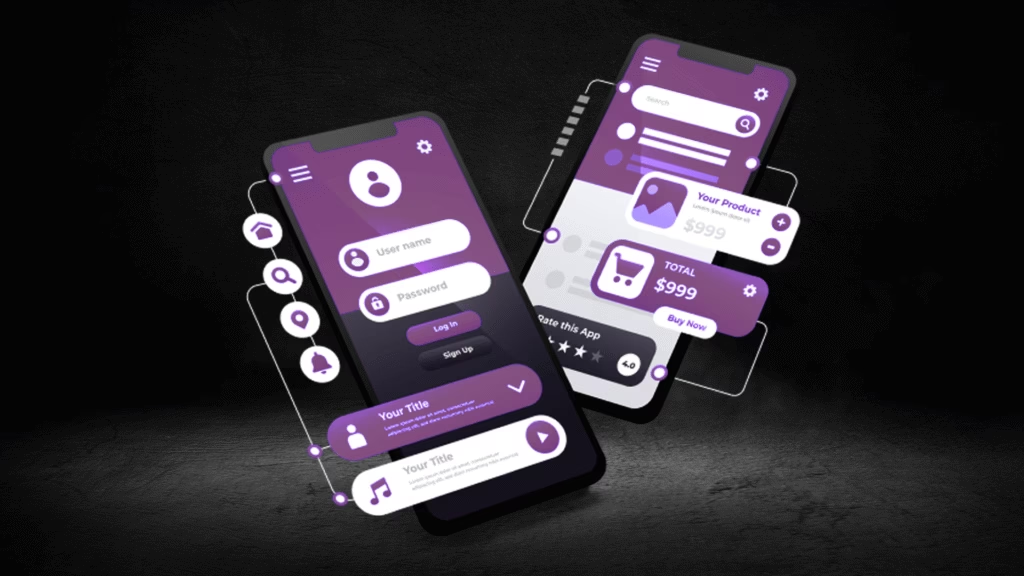
Introduction to Mobile Application Development in the Legal Industry
The legal industry is undergoing a transformative change, fueled by advancements in technology—particularly in mobile application development. As law firms increasingly recognize the importance of technology in their operations, they are adopting mobile applications to enhance efficiency and improve client engagement. This evolution is not just a passing trend, but a necessary adaptation to meet the demands of a modern society that values convenience and accessibility.
Mobile applications serve as powerful tools for law firms, offering various functionalities that streamline daily operations and facilitate communication with clients. These applications enable lawyers to manage their caseloads, schedule appointments, and share updates seamlessly with clients, thereby improving the overall client experience. The growing prevalence of smartphones has paved the way for law firms to leverage mobile platforms, making legal services more accessible to a broader audience. Clients can now find legal assistance right at their fingertips, leading to increased client retention and satisfaction.
Moreover, the incorporation of mobile application development within law firms is transforming traditional operations. With features such as document sharing, real-time notifications, and virtual consultations, law firms are now able to operate more efficiently and responsively. This technological shift allows legal professionals to focus more on their core responsibilities—providing quality legal advice—while enabling clients to interact with their legal representatives in a more user-friendly manner. As a result, the legal landscape appears to be evolving toward a future where mobile applications are integral to law firm operations and client relations.
Benefits of Mobile Applications for Law Firms
The rapid advancement of mobile application development has provided a unique opportunity for law firms to enhance their service delivery and client engagement significantly. One of the most compelling benefits is improved client communication. Mobile applications facilitate instant messaging and video conferencing capabilities, enabling seamless interaction between attorneys and clients. For instance, a recent study indicated that firms employing mobile apps experienced a 30% increase in client response rates, fostering a more robust client-lawyer relationship.
Moreover, mobile applications can greatly increase efficiency in case management. With streamlined workflows and real-time updates, attorneys can manage case documents, share files, and track progress directly from their smartphones. This level of accessibility ensures that lawyers are always equipped with the latest information, reducing delays and unnecessary back-and-forth communication. Results from law firms implementing mobile solutions suggest that they have observed a 25% reduction in case processing time, ultimately benefiting both the attorney and the client.
Additionally, mobile applications provide enhanced time tracking features. Lawyers can record billable hours accurately while on the go, leading to more precise invoicing and reduced errors in billing. Statistics demonstrate that legal professionals who utilize mobile solutions for time tracking are 40% more likely to claim their full billable hours. This increased accuracy translates into improved revenue for law firms.
Lastly, easy access to legal resources is one of the most critical advantages of mobile apps. Attorneys can quickly reference statutes, legal precedents, and jurisprudence from anywhere, ensuring they possess the knowledge needed to support their cases effectively. This capability not only improves the quality of legal counsel offered but also enhances the overall credibility of the firm.
Essential Features of a Legal Mobile Application
In the realm of mobile application development for law firms, the integration of specific essential features can significantly enhance client experience and operational efficiency. One crucial feature is the client portal, which serves as an access point for clients to view their case information, documents, and updates. This ensures transparency and empowers clients, fostering a sense of trust and engagement.
Document sharing capabilities are also pivotal in a legal mobile application. Law firms often deal with sensitive documents, and a secure sharing system allows for the seamless exchange of files between attorneys and clients. This ensures that both parties are on the same page, and compliance with confidentiality is maintained, which is fundamental to legal practices.
Additionally, appointment scheduling tools can streamline the client consultation process. By offering a user-friendly calendar interface within the mobile application, clients can easily select available time slots for meetings, reducing the back-and-forth communication typically required for scheduling. This convenience can enhance client satisfaction and optimize the use of attorneys’ time.
Billing and invoicing functionalities are another vital aspect to consider. A well-designed mobile application can automate invoicing processes, allowing clients to view and pay their bills directly within the app. This feature not only simplifies payment collection but also provides clients with a transparent understanding of services rendered, which can improve cash flow for law firms.
Finally, secure communication channels are essential in mobile application development for law firms. Enabling encrypted messaging allows for confidential discussions between clients and attorneys. This feature reassures clients that their conversations are protected, reinforcing the confidentiality necessary for legal interactions. The inclusion of these essential features can greatly enhance the service delivery of law firms, positioning them as forward-thinking and client-focused in the increasingly competitive legal market.
Steps to Develop a Mobile Application for Your Law Firm
Developing a mobile application for a law firm is a strategic process that requires careful planning and execution. The first step in mobile application development is conducting thorough initial research. This involves analyzing the needs of potential users, understanding the legal niche you are targeting, and reviewing existing applications within the legal sector. Gathering insights from clients and industry trends ensures that the application aligns with the expectations of your law firm’s clientele.
The next crucial phase is defining clear objectives for the application. Law firms must establish what they wish to achieve with the mobile app—whether it’s improving client engagement, providing legal resources, or facilitating communication between clients and attorneys. These defined goals will act as a guiding framework throughout the development process.
Once objectives are set, the design process begins with wireframing. This stage includes creating visual representations of the application’s user interface and layout. Prototyping follows, enabling you to develop a functional model of the mobile application. This prototype serves as a basis for feedback, ensuring that stakeholders can review and suggest enhancements before the full-scale development begins.
Testing is an integral step in mobile application development. This process involves assessing the application’s functionality across various devices and platforms to identify any bugs or usability issues. Engaging stakeholders and potential users during this testing phase will provide invaluable feedback, ensuring the app meets user expectations and legal compliance standards.
Finally, once testing is complete and adjustments have been made, the application can be launched. However, it is important to continue gathering user feedback post-launch to facilitate ongoing improvement and updates. By following these steps diligently, law firms can successfully create a mobile application that enhances their services and better serves their clients.
Choosing the Right Technology Stack for Legal Apps
When law firms consider mobile application development, one of the pivotal decisions revolves around selecting the appropriate technology stack. The technology stack serves as the foundation for app development, influencing performance, security, and user experience. Initially, firms must decide between native and hybrid app development. Native apps, developed specifically for a particular operating system, often offer superior performance and a more seamless user experience due to their optimized interactions with device hardware and software. In contrast, hybrid apps provide the advantage of cross-platform compatibility, allowing law firms to reach a broader audience with a single codebase, which can significantly reduce development time and costs.
Following the decision on app type, selecting the right programming languages becomes crucial. For native app development, popular languages include Swift for iOS and Kotlin for Android. Utilizing these modern programming languages ensures that legal apps are built on robust frameworks that facilitate better performance and efficiency. Alternatively, if a firm opts for hybrid development, languages such as JavaScript, CSS, and HTML5 can be employed, along with frameworks like React Native or Flutter. Each choice comes with its own set of advantages and trade-offs that law firms must carefully assess based on their specific requirements and target audience.
Additionally, understanding backend needs is essential for successful mobile application development. This encompasses the selection of databases, server environments, and application programming interfaces (APIs). A scalable backend infrastructure ensures that the app can handle varying loads, while maintaining data security is particularly critical for legal professionals who deal with sensitive client information. Options such as cloud-based services, which offer flexibility and scalability, might be a viable path for law firms looking to future-proof their applications. Ultimately, by carefully considering the technology stack, law firms will establish a solid foundation for their mobile applications, thereby enhancing operational efficiency and client engagement.
Security and Compliance in Legal Mobile App Development
In the rapidly evolving landscape of mobile application development, law firms face unique challenges regarding security and compliance. The protection of client data is paramount, as legal professionals handle sensitive information daily. Consequently, it is crucial for law firms to adopt stringent security measures to safeguard this data from unauthorized access and breaches.
One of the fundamental aspects of ensuring security in legal mobile app development is compliance with data protection laws. Law firms must familiarize themselves with regulations such as the General Data Protection Regulation (GDPR) and the Health Insurance Portability and Accountability Act (HIPAA), which dictate how personal data should be handled. Adhering to these regulations not only mitigates the risk of legal repercussions but also fosters trust with clients, who expect their information to be treated with the utmost confidentiality.
Encryption standards play an essential role in securing data transmitted through mobile applications. Implementing end-to-end encryption ensures that information remains protected during transmission, rendering it unreadable to potential interceptors. Additionally, law firms should consider regular security audits and vulnerability assessments to identify and rectify any potential weaknesses within their mobile applications.
Best practices for mobile application development in the legal sector also include multi-factor authentication, robust user access controls, and timely updates to address security vulnerabilities. By equipping their applications with these mechanisms, law firms can significantly reduce the likelihood of security breaches that may jeopardize client information.
Ultimately, as law firms embark on mobile application development initiatives, prioritizing security and compliance is non-negotiable. Implementing effective strategies not only protects client data but also enhances the firm’s reputation in an increasingly competitive market.
User Experience and Interface Design in Legal Applications
The significance of user experience (UX) and user interface (UI) design in mobile application development for law firms cannot be overstated. An effective legal application must prioritize both the users—law professionals and their clients—ensuring that it effectively caters to their unique needs while facilitating seamless navigation. Proper design principles enhance not only the usability of the app but also its ability to engage users, which is vital in an industry where time and clarity are paramount.
First and foremost, the user interface should be intuitive, allowing users to access essential features with minimal effort. This means employing a clean layout, straightforward navigation, and a clear hierarchy of information. Legal professionals often juggle multiple cases and require rapid access to case files, communication tools, and documentation. Therefore, a well-structured UI reduces frustration and helps streamline workflow, enabling lawyers to focus on delivering quality legal services rather than struggling with the application.
Moreover, user experience extends beyond a visually appealing interface. It entails ensuring that the application is responsive and performs reliably across devices. This reliability is particularly important in mobile application development, as many users may access legal platforms on-the-go, needing immediate access to information. The use of familiar design patterns, such as menus and icons, further facilitates a smoother experience for users. Additionally, incorporating accessibility features can significantly widen the audience, allowing law firms to cater to clients with varying degrees of familiarity with technology.
Ultimately, the design of mobile applications for law firms must reflect the formal nature of legal work while remaining user-friendly. By synthesizing effective UI and UX principles, legal apps can bridge the gap between technology and user needs, significantly enhancing service delivery in a rapidly evolving legal landscape.
Strategies for Effectively Marketing Your Law Firm’s Mobile Application
As law firms increasingly turn to mobile application development to enhance their client services, effective marketing strategies become crucial to maximize the reach and impact of these applications. Identifying target audiences sets the foundation for a successful marketing campaign. Law firms should analyze their clientele demographics, preferences, and existing digital behavior to tailor strategies that resonate with their needs. By understanding the characteristics of potential users—ranging from individuals seeking legal advice to corporate clients—firms can craft a focused marketing approach.
Utilizing social media is another powerful method for promoting a law firm’s mobile application. Platforms such as Facebook, LinkedIn, and Twitter offer unique avenues to engage with clients and communicate the application’s features and benefits. Creating informative content that emphasizes legal solutions catered to the audience can stimulate interest and encourage downloads. Furthermore, utilizing paid advertisements on these platforms can amplify reach, targeting specific user profiles based on their interests in legal services.
Optimizing the app store listing is a critical step that directly influences visibility. Law firms should ensure that their application title, description, and keywords are strategically chosen to improve its ranking within app store searches. Incorporating relevant phrases synonymous with mobile application development for legal services enhances discoverability—and potential clients will find it easier to reach the application when searching for legal assistance.
Employing digital marketing strategies, such as search engine optimization (SEO) and content marketing, can also play a significant role in building awareness around the mobile application. By regularly sharing informative content through blogs or articles that address common legal queries, law firms can organically attract consumers interested in their services. This approach not only builds trust but positions the law firm as an authority in the legal field.
In conclusion, a combined effort of understanding the target audience, leveraging social media, optimizing app listings, and employing strategic digital marketing can lead to the successful promotion of a mobile application for law firms, ultimately enhancing client engagement and service delivery.
Measuring Success: Analytics and Feedback
Once a mobile application for law firms has been launched, it is crucial to assess its effectiveness and user engagement to ensure that it meets the intended goals. Measuring success in mobile application development involves utilizing a variety of analytics and user feedback mechanisms. These tools not only help in understanding user behavior but also in identifying key areas that may require improvement.
Analytics tools provide insights into how users interact with the legal mobile application. Metrics such as download numbers, user retention rates, and session duration can indicate how effectively the app is serving its purpose. For instance, a high retention rate coupled with longer session durations may signify that users find the app’s features beneficial. Conversely, a spike in uninstalls may suggest that there are significant usability issues or features that fail to meet user expectations.
User feedback plays a vital role in evaluating the mobile application’s performance and overall usability. Law firms should actively encourage users to provide their opinions through in-app surveys, reviews on app stores, and direct feedback channels. This qualitative data can highlight specific pain points or desired features that users may want. By applying this feedback, law firms can make informed decisions about necessary adjustments or additional functionalities for the application.
Furthermore, regular analysis of performance metrics can guide future updates. The development team can prioritize enhancements based on collected data and feedback, ensuring that the application evolves in line with user needs. By establishing a systematic approach to measuring success, law firms can not only improve their mobile applications but also enhance client satisfaction, ultimately leading to better service delivery and increased competitiveness in the legal market.








